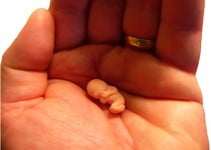An ectopic pregnancy is commonly known as a tubal pregnancy. However, in some cases, it will occur in the abdominal cavity, cervix or ovary. Keep reading to know about ectopic pregnancy signs, risk factors, and diagnosis.
An embryo that is implanted to any site other than uterine cavity results in ectopic pregnancy. The most common site of ectopic pregnancy is fallopian tubes, which transport the egg from ovaries to the uterus and are also the site of fertilization – mating of sperm and egg. Other sites include ovaries and abdominal cavity. [1]
This type of pregnancy cannot proceed normally because the growing tissue could destroy several maternal structures or the fertilized egg will not survive.
If left untreated, it is possible for the woman to have blood loss that is life threatening. Early treatment is important to help preserve the woman’s chances of having healthy pregnancies in the future.
Ectopic Pregnancy Signs or Symptoms
If you have this type of pregnancy, you might not see any signs or symptoms at first. In other instances, early symptoms and signs might be similar to other pregnancies, so you will have a missed period, nausea, and breast tenderness.

“Schematic figure of vaginal ultrasound in ectopic pregnancy” by Mikael Häggström, from original by BruceBlaus – File:Blausen 0602 Laparoscopy 02.png. Licensed under Wikimedia Commons.
Light vaginal bleeding with pelvic or abdominal pain is usually the first warning sign. You could also suffer from shoulder, lower abdominal, or neck pain, plus feel the urge to pass faeces if blood is leaking from the ruptured fallopian tube and accumulating in space between rectum and vagina (pouch of Douglas).
A ruptured fallopian tube can cause heavy bleeding in the abdomen followed by shock, light-headedness, and fainting.
Other symptoms include vomiting and nausea with pain, weakness or dizziness, pain on just one side of the body, or sharp abdominal cramps.
Risk Factors for Ectopic Pregnancy
There are many factors associated with this pregnancy, which is not surprising as it’s estimated that twenty in every one thousand pregnancies are ectopic[2]. The risk factors include:
- Infection or inflammation: An infection of the ovaries, fallopian tubes or uterus or an inflammation of a fallopian tube will increase your risk of having an ectopic pregnancy. The infections are often caused by chlamydia or gonorrhea and are called pelvic inflammatory disease (PID).
- Previous ectopic pregnancy: A history of previous ectopic pregnancy increases the likelihood of another one in subsequent pregnancies as well.
- Fertility problems: Some researchers believe that this pregnancy is associated with fertility issues.
- Choice of contraceptive: It is rare for a woman to get pregnant while using an intrauterine device or IUD, but if conception occurs, it’s highly likely to be ectopic. This is also true for pregnancy that occurs after a tubal ligation, which is a permanent birth control method known commonly as tying the tubes.
- Structural concerns: You are likely to have an ectopic pregnancy if your fallopian tube is damaged or has an unusual shape. The risk will also be high if surgery is done to reconstruct your fallopian tube.
- Cigarette smoking: You have a higher risk if you are smoking right before getting pregnant. The risk will get even greater if you continue to smoke. [3]
Ectopic Pregnancy Diagnosis
Your doctor will do a pregnancy test, ultrasound, and a pelvic exam to see the condition of your fallopian tubes and uterus.
If the ectopic pregnancy is confirmed, your doctor will decide on the most appropriate treatment options based on your existing medical condition and plans for future pregnancy.
Treatment for Ectopic Pregnancy
Emergency surgery will be necessary if the doctor thinks that you have a ruptured fallopian tube as the bleeding would have to be stopped. In some instances, removal will be needed if the ovary and fallopian tube is damaged.
If your pregnancy is not far along and you have a ruptured fallopian tube, a laparoscopic surgery might be necessary for embryo removal and a repair of the damage.
For this surgery, the doctor will make a tiny incision in the fallopian tube and remove the embryo without interfering with the integrity of the fallopian tube.
Medication might be used in some cases to stop the development of pregnancy tissue. For you, this treatment option might be the most appropriate if you don’t have a ruptured fallopian tube and your pregnancy is not too far along.
Bear in mind that additional blood tests will be done after medical treatment to ensure that the tubal pregnancy is not removed completely.
An ectopic pregnancy can be sad and scary. There are rare cases where the baby might not survive, and it’s a loss that you might take a while to get over.
You should not hesitate to contact your doctor immediately or go to an emergency room if you’re experiencing any of the symptoms above. If you get to the hospital as quickly as possible, this will lower the risk of severe bleeding or hemorrhage, as well as help to preserve your fertility.
Although all of this might sound frightening, you should take comfort in the fact that it is possible to have healthy pregnancies in the future after having an ectopic pregnancy.
References



